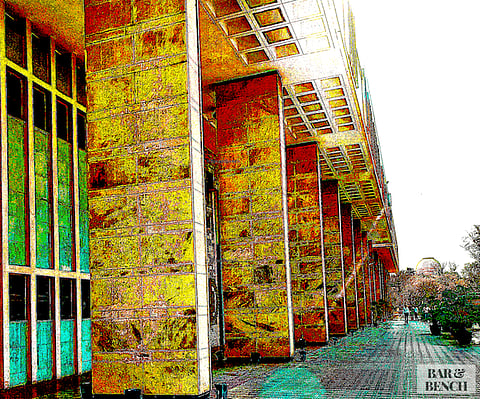
- Latest Legal News
- News
- Dealstreet
- Viewpoint
- Columns
- Interviews
- Law School
- Legal Jobs
- हिंदी
- ಕನ್ನಡ

The Delhi High Court has issued notice in a plea seeking to clarify if the opinion or order of exoneration rendered by the Medical Council is binding on investigating agency or on the courts.
The plea also questions if the Medical Council is authorized to pass a final order in favour of an allegedly negligent doctor under the guise of expert opinion, when a criminal complaint against the doctor is pending before a Magistrate.
Notice in the plea was issued to the Delhi Medical Council by a single Judge Bench of Justice Navin Chawla.
Th questions have been raised in a petition preferred by a two-year old brain damaged child and her mother.
The petition alleges that the child has been rendered permanently disabled, both neurologically and bodily, by an act of mens rea committed by Fortis Hospital, Shalimaar Bagh. It is also alleged that the Hospital dishonestly concealed the fact that the child had suffered a severe brain haemorrhage during the caesarean delivery at the hospital.
The parents thus made a criminal complaint against Fortis and its doctors under Section 325, 338, 308, 193, 201, 406, 471 and 120B of the Indian Penal Code. However, due to the nature of the allegations, the police treated the complaint as that of pure medical negligence and sent it across to Delhi Medical College for an “Expert Opinion” for an opinion of registration of an FIR.
The petitioners have alleged that the Delhi Medical Council, which is not empowered to act as an “expert body”, exercised “colorable powers” and exonerated the delinquent practitioner in a criminal matter based on an oral hearing and false and fabricated evidence.
The petitioners fear that such orders of exoneration are blindly followed by the Police to finally close the criminal complaints, even those involving commission of heinous crime, at the very threshold.
In the present case, the petitioners have thus contended that the investigation into the criminal complaint against the doctor and others was being obstructed by a “superficial exoneration” granted by the Medical Council in a disciplinary proceeding.
In the writ petition filed before the Court, the petitioners have, therefore, raised the following questions of law:
Whether the Medical Council created under the Delhi Medical Council Act, 1997 can act as an “Expert Body” for granting “Expert Opinions” to an investigating agency in Criminal matters?
Whether the Medical Council is authorized to pass a ‘verdict of innocence’ in favour of an accused, under the guise of expert opinion, in the face of pending criminal complaint before the Court of Magistrate?
Whether a committee constituted for purpose of only peer review, can act as an arbiter of dispute by fielding medical practitioners to argue against a victim or a layman?
Whether an order passed by the Medical Council in its disciplinary proceedings would be analogous to “medical opinion” to meet the threshold pre-requisite of “prima facie evidence”?
Whether the Medical Council by its act of passing an order of innocence at the preliminary stage of enquiry, can take away the rights of the victim to seek disciplinary proceedings once the investigation or trial is concluded?
Whether the fate of criminal prosecution should depend solely on the outcome of disciplinary proceedings or contrarily it is the disciplinary proceedings that should await the outcome of criminal prosecution?
Whether the medical council could have adjudicated a criminal complaint which primarily alleges fabrication of medical records, concealment of facts and mens rea even prior to commencement of due process of investigation?
Whether an opinion or an order of acquittal rendered by the Medical Council shall be binding on the investigating agency or on the courts?
While issuing notice to the respondents, Delhi Medical Council and the Hospital, the Court stayed the order exonerating the doctor of all charges.
The respondents have four weeks time to file a counter affidavit in the matter.
The petitioner was represented by Advocates Sachin Jain, Ajay Kumar Aggarwal, Isha Aggarwal.
Delhi Medical Council was represented by Advocate Pravin Khattar.
The matter would be taken up next on July 15.
Read the petition and the order: